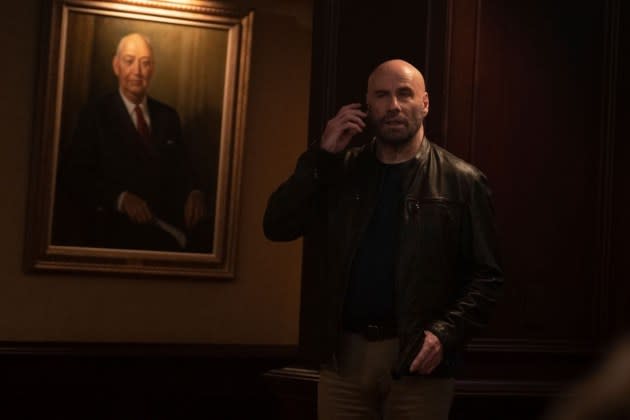‘Cash Out’ Review: John Travolta Goes Through the Motions in Uninspired Crypto Caper

If you’ve been wondering when a heist movie would wed traditional bank-robbing sequences with the current fixation on cryptocurrency, “Cash Out” is here to answer that question. And yet little about this John Travolta vehicle feels new or even timely, as the would-be thriller directed by Ives trades exclusively in shopworn tropes that by now are de rigueur for the genre. It is, as you might imagine, the story of one last job before our protagonist can finally hang it up for good — which is also how one imagines the role itself might have been pitched to Travolta.
The actor, who at this point is like a past-his-prime slugger dragging down his career batting average, brings a familiar name to “Cash Out” but none of the vibrancy we’ve seen from him in the past. He stars as Mason Goddard, whom we meet as he and his femme-fatale inamorata Amelia Decker (Kristin Davis) arrive at a swanky gathering in their private jet as a pretext for stealing a few million-dollar cars. Though clearly intended to convey a sense of luxury, the low-rent production values make both characters and movie feel ersatz from the outset. It seems an easy enough gig nevertheless, especially with the support of Mason’s experienced crew, but it all goes pear-shaped once Amelia pulls a gun on him and reveals that her true allegiance has been to the FBI all along. He never saw the double cross coming, presumably because he’s never seen the opening sequence of a caper before.
More from Variety
John Travolta Presents 'Grease' at 12th IFF Panama, Declares Desire to Work With Latino Filmmakers
John Travolta, Pierce Brosnan, Charlotte Kirk Films Among Palisades Park Pictures FilMart Slate
He and his team elude capture via Plan B, which entails little more than driving into the water in clear view of their pursuers and banking on the cops immediately giving up their search, which, for some reason, they do. Heartbreak compounded by failure leads to retirement for our world-weary crew leader, but of course it doesn’t last long — younger brother Shawn (Lukas Haas), who has a bit of a Fredo vibe to him, needs him for one actual last job. Just when he thought he was out …
Every line of dialogue that follows from this tired premise is like an echo of one from a better movie. Rest assured that you’ll hear one of Mason’s underlings say “we’ve got company” when the police show up, potentially inspiring you to wonder why you aren’t rewatching something like “Heat” instead. A bit of familiarity can be forgiven if they’re at least in service of inventive set pieces, but the actual bank robbery is just as lackadaisical as everything else in “Cash Out.”
For as clear as it is that this would-be heist is massively ill-advised, it’s even clearer that Mason still carries a torch for his ex despite her betrayal — making it inevitable when she ends up being the negotiator sent in to bring about a peaceful resolution to what quickly becomes a hostage situation. Our hero naturally takes this as an opportunity to ask her whether she’s been working out rather than, oh, make demands for the nonviolent release of his captives. It’s contrived, yes, but it also leads to the only exchanges that distinguish the film from its countless genre forebears.
Mason brings an I’m-not-even-supposed-to-be-here energy to the heist, treating his hostages as reluctant guests rather than pistol-whipping them into fearful compliance. It’s a refreshing change of pace from what we usually see in such scenes, even if it does underscore one of the film’s key weaknesses: its lack of urgency. Just as Mason goes through the motions on a job he doesn’t want to be pulling, using it as a chance to get his estranged lover back rather than a means of getting rich, the film itself can’t seem to muster the energy to make us care about much of this.
Fitting, then, that the safe-deposit box in question isn’t a jackpot so much as a can of worms — its exact contents, to say nothing of its owner, instantly sound like more trouble than they’re worth. The same can be said of “Cash Out” itself, whose risk-reward ratio doesn’t justify getting pulled back in.
Best of Variety
Sign up for Variety’s Newsletter. For the latest news, follow us on Facebook, Twitter, and Instagram.

